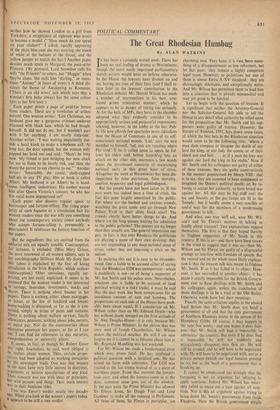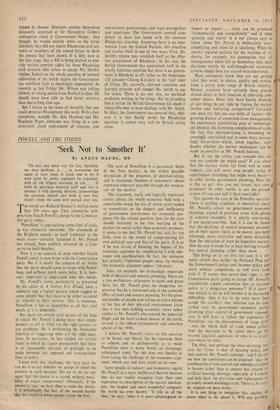POLITICAL COMMENTARY
The Great Rhodesian Humbug
By ALAN WATKINS
IT has been a curiously muted week. There has been no real feeling of drama at Westminster, though the more easily impressed parliamentary sketch writers would have us believe otherwise. In the House the lawyers have droned on and on, having the time of their lives (and I shall re- turn later to the lawyers' contribution to the Rhodesian debate). Mr. Harold Wilson has made a number of interventions in his best, new- found prime ministerial manner, which he appears to be in danger of taking too seriously. As for the bulk of MPs, they have in the chamber adopted what they evidently consider to be appropriately serious and purposeful expressions; relaxing, however, in the lobby or the bar. Pub- lic life now affords few spectacles more ridiculous than the House of Commons in one of its self- consciously national moods. 'Lad,' says the new member to himself, 'lad, you are treading where Pitt trod.' If he is called upon to speak he fol- lows his elders and, before launching into an attack on the other side, murmurs a few words about the paramount necessity of maintaining national unity in this grave hour of crisis. Altogether the week at Westminster has been dis- tinguished by false patriotism, false morality, unction, hypocrisy and legal gobbledegook.
But the people have not been taken in. If this past week has indeed been a time of crisis, the fact has gone largely unnoticed by the public. For where are the hushed and anxious crowds, watching the great come and go through New Palace Yard in their shiny black cars? The crowds clearly have better things to do. And where are the long queues waiting for admission to the public galleries? The queues are no longer than they usually are. The general impression one gets, in fact, is that over Rhodesia the politicians arc playing a game of their own devising; they are not responding to any deep national sense of crisis; rather they are imposing a crisis on the nation.
In pointing this out it is easy to be misunder- stood. One is liable to be accused either of saying that the Rhodesian UDI was unimportant--which it manifestly is not—or of being a supporter of Mr. Ian Smith and his police state. Nevertheless, whatever one is liable to be accused of (and political writing is a risky trade), it must be said that the past week has been conspicuous for an inordinate amount of cant and humbug. The proportions on each side of the House have prob- ably been about equal. If I concentrate on Mr. Wilson rather than on Mr. Edward Heath--who has without doubt reneged on the firm attitude of Sir Alec Douglas-Home--it is only because Mr. Wilson is Prime Minister. In the phrase that was once used of Joseph Chamberlain, Mr. Wilson makes the political weather. He will T am sure forgive me if I cannot be as fulsome about him as Mr. Reginald Maudling was last weekend.
For Mr. Wilson has made a fundamental error which may prove fatal. He has confused a political question with a juridical one. He has mixed up form with substance. The UDI was treated as the last trump instead of as a piece of worthless paper. From that moment the lawyers took over, and when the lawyers come in at the door, common sense goes out of the window. In the past week the Prime Minister has allowed Sir Elwyn Jones, Sir Dingle Foot and Lord Gardiner to make all the running in Parliament. All three' of them, Sir Elwyn in particular, are charming men. They have, it is tripe, been some- thing of a disappointment as law reformers, but let that pass: they remain a highly competent legal team. However, as politicians not one of them is above Extra A XV standard: they are distressingly dilettante, and exceptionally naive. And Mr. Wilson has permitted them to lead him into a situation that is already nonsensical and may yet grow to be farcical.
Let us begin with the question of treason. It is significant that neither the Attorney-General nor the Solicitor-General felt able to tell the House in any detail what authority he relied upon for the proposition that Mr. Smith and his sup- porters were guilty of treason. However, the Statute of Treason, 1351, lays down seven cases, of which the best bets in the Rhodesian situation would seem to be the following two: 'where a man doth compass or imagine the death of our lord the king, or our lady the queen, or of their eldest son and heir .. . or if a man do levy war against our lord the king in his realm.' Now if Mr. Smith and his colleagues are guilty of either of these treasons, they are guilty constructively in the manner popularised by Henry VIII: that is to say, they are assumed to have compassed or imagined the Queen's political death; or, by re- fusing to accept her authority, to have levied war against her. All this may be big stuff over the tea and biscuits as the gas lamps are lit in the Temple: but it hardly seems a very sensible or useful way for the members of a modernising government to talk.
And what, one may well ask, were Mr. Wil- son's and Sir Elwyn's motives in talking so loudly about treason? Two explanations suggest themselves. The first is that they hoped thereby to frighten supporters of Mr. Smith in this country. If this is so--and there have been straws in the wind to suggest that it was so—then Mr. Wilson and Sir Elwyn are guilty of a disgraceful attempt to interfere with freedom of speech. But the second and on the whole more likely explana- tion is that the treason talk was meant to frighten Mr. Smith. If so it has failed in its object. How- ever, it has succeeded in another object: it has made it utterly impossible for the British Govern- ment ever to have dealings with Mr. Smith and his colleagues again, unless the conclusion of those dealings is to be a trial at the Old Bailey. Otherwise words have lost their meanings.
Exactly the same criticism applies to the absurd legal fiction that Mr. Smith does not head a. government at all and that the only government of Southern Rhodesia inures in the person of Sir Humphrey Gibbs. Of course, it may happen in the next few weeks —and one hopes it does hap- pen--that Mr. Smith will find it impossible to administer the country. But even if he does find it impossible, he will not suddenly and miraculously disappear into thin air. He will still be around, and he will have to be negotiated with. He will have to be negotiated with, not as a private person (which our legal lunatics pretend he is), but as the head of a government that is breaking up.
It cannot be emphasised too strongly that the foregoing is not an argument for refusing to apply sanctions. Indeed Mr. Wilson has miser- ably failed to make out a case against oil sanc- tions. Nor is this an argument against trying to bring down Mr. Smith's government from inside Rhodesia. Here the British government simply
missed its chance. Ministers confess themselves pleasantly surprised at Sir Humphrey Gibbs's courageous stand at Government House: they thought he would quietly retire to his farm. Similarly they did not expect Rhodesian civil ser- vants or members of the armed forces to show the unease they have shown. It is Only now at this late stage, that a Bill is being drafted to pro- vide various pension rights for those Rhodesian civil servants who refuse to accept Mr. Smith's regime. Indeed on the whole question of internal subversion of the Smith regime the Government has exhibited itself as shockingly unprepared. As recently as last Friday Mr. Wilson was talking blithely of taking advice from Radio Caroline. He should have been able to Lind better advisers than that a long time ago.
But I return to the sense of unreality that one could detect at Westminster this week. With a few exceptions, notably Mr. bin Macleod and Mr. Reginald Paget, everyone was living in a con- stitutional cloud cuckooland of treasons and
non-existent governments and royal prerogatives and unpersons. The Government seemed com- pletely to have lost touch with the concrete Rhodesian situation. Assuming there is no inter- vention from the United Nations, this situation- can resolve itself in one of two ways. First, Mr. Smith's regime may establish itself as the effec- tive goverhment of Rhodesia: in this case the British Government has committed itself to the wholly ludicrous position that there is no govern- ment in Rhodesia at all; rather as the Americans still consider Chiang Kai-shck as the 'real' ruler of China. Or, secondly, external sanctions and internal pressure will compel Mr. Smith to sue for terms. There is no one else, no mythical moderate waiting in the wings. But by.branding him a traitor the British Government has made it impossible ever to have dealings with Mr. Smith. In effect, the Government has ensured that, who- ever it is that finally settles the Rhodesian question, it cannot very well be Britain acting alone.



































 Previous page
Previous page